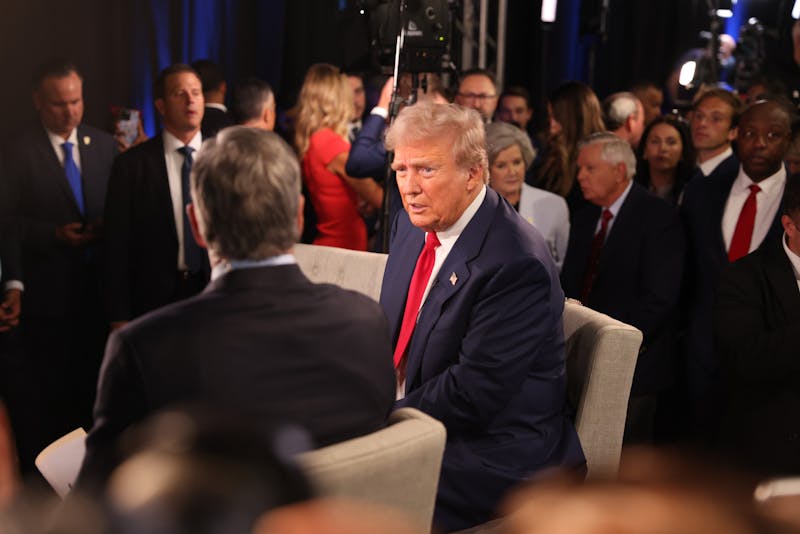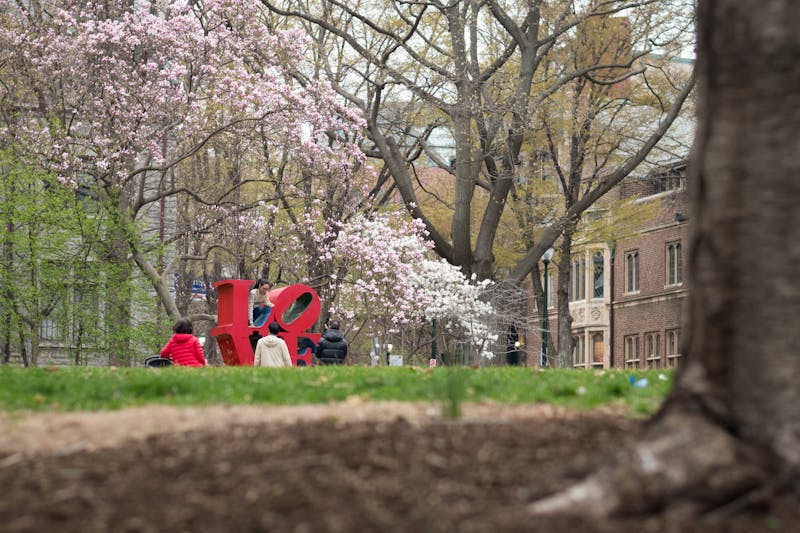
Columnist Mariana Martinez argues that Gen Z consumption plays an important role in the mergers and acquisitions climate in the beauty industry.
Credit: Abhiram JuvvadiAmid a volatile economic climate, Rhode — Hailey Bieber’s celebrity makeup line — has sold for $1 billion to e.l.f. Beauty.
This deal might strike as odd, especially given recent economic uncertainty and paranoia. Every morning, headlines announce that something else has gone wrong with the market. Even consumers have become pessimistic about the future of the economy: The consumer sentiment index for the first quarter in May was down 30% since January. Consumers anticipate unemployment and inflation. Clearly American households have felt the impact of the latest economic turmoil.
Investors have turned cautious as United States stocks have pointed towards weaker openings: As of May 28, the Dow Jones was down 0.6% and the Nasdaq fell 0.5%. The Dow Jones and Nasdaq are key indicators used by investors to gauge market trends. With both of them slowing down, investors have reasons to worry about the state of the American economy. The tech sector has been in freefall: From Apple to Tesla there is a collective sentiment of uncertainty. The beauty sector is no exception. Troubles in the retail sector and drugstore closures have slowed beauty products sales: Sephora and Kohl’s have experienced a drop in transactions since the fourth quarter of 2024.
However, amidst headline warnings, financial freefalling, and a merger & acquisition activity slowdown, e.l.f.’s bold acquisition of Rhode might tell a different story — one of confidence, consumer power, and cultural capital.
E.l.f.’s chief executive, Tarang Amin, expressed hope as he recognized the “power” in the merging of the two brands. E.l.f. is confident that it can grow its returns, finding a stronger foothold in the Rhode acquisition. This deal breaks a pattern in recent mergers and acquisitions activity. For example, popular beauty brand, Rare Beauty struggled to build credibility in the market and after a $2 billion valuation, had to halt its sale process because buyers were reluctant to pay steep prices for a celebrity brand. Past sales, like Kylie Cosmetics, which sold for $600 million in 2020, highlight the challenge of carving a path to a billion-dollar deal for a celebrity cosmetics line.
The question becomes, then: why now? Why has e.l.f. decided to embark on what could be deemed a risky deal? The majority of its products are made in China and the brand has just recently entered the Mexican market, standing at a crossroads between increased profits and 1968 Wharton graduate and President Donald Trump’s trade wars. It appears that Gen Z consumer power can counterbalance macroeconomic volatility, creating a climate that could actually encourage mergers and acquisitions.
In the past decade, the rise of celebrity cosmetic lines has brought a change in marketing strategies that predominantly seek to target young people through platforms such as Instagram and TikTok. Rhode has not been an exception. With its unique beauty trends like the captivating lip balm phone case and the “glazed doughnut dreams” campaign, Bieber was able to gain loyal fans. After the release of the phone case “set the Internet abuzz” in August 2023, Rhode was closing in on selling its first million tubes of the iconic lip peptide treatment (and the case), totaling over $16 million.
As TikTok revolutionizes commerce, it may also become a tool of soft power that encourages loyalty from fans — fans who might be willing to absorb the cost of tariffs. E.l.f. has announced that it was increasing its prices across its portfolio by $1 billion. This increase means consumers will certainly absorb part of the cost of the trade war.
One of Rhode’s key distinguishing features has been its ability to turn Bieber into the face of the “clean girl aesthetic.” More than selling makeup, Rhode has been selling a product ecosystem that glows with the idea of “effortless beauty.” The trend went “stratospheric” with the launch of Rhode as girls started to want to look like a Beverly Hills Pilates princess. Rhode is, simply, aesthetically pleasing. Social media trends tend to create a dopamine rush in users who curate an idealized version of themselves. Hence, TikTok marketing has been able to spike sales from brands like Rhode that capitalize on that dopamine.
According to Rob Long, TikTok has become a piece of “pro-American” propaganda, where young Americans show glimpses of their shiny American kitchens and massive bathrooms. This translates to business: As TikTok becomes more and more entangled with soft power, exporting American ideals like the clean girl aesthetic, it increases the likelihood of cross-border transactions. For example, in 2022, nearly 50% of the people visiting the Rhode website were from outside of the United States, even though the brand doesn’t do any active marketing outside the United States. Perhaps international transactions and Gen Z consumer power — greatly influenced by TikTok — could generate the security and confidence needed for the recent acquisition.
It wouldn’t be the first time consumer power goes transnational, counterbalancing potential additional costs or macroeconomic risks. Fenty Beauty, Rihanna’s cosmetic line, was an international success as well. In the midst of the pandemic uncertainty, it launched a summer line and generated $100 million in sales during the first week alone. The brand was created under the umbrella of LVMH Moët Hennessy Louis Vuitton, a luxury giant, with prices starting at $30, setting it as a prestige player, compared with, for instance, E.l.f. products that sell for $6.50 on average. Still, Fenty’s marketing strategy that appealed to inclusivity fostered global loyalty and trust among Gen Z, even with the 2020 COVID-19 volatility and the elevated luxury product costs.
The e.l.f-Rhode deal reveals deeper market interactions building among the noise of stock crashes and slowdowns. Consumer loyalty — especially that of Gen Z— can counterbalance macroeconomic shifts, creating a haven of opportunity and hope for mergers and acquisitions in what’s perceived to be a fragile market today.
MARIANA MARTINEZ is a College junior from Bogotá, Colombia. Her email is marmari@sas.upenn.edu.
The Daily Pennsylvanian is an independent, student-run newspaper. Please consider making a donation to support the coverage that shapes the University. Your generosity ensures a future of strong journalism at Penn.
Donate










